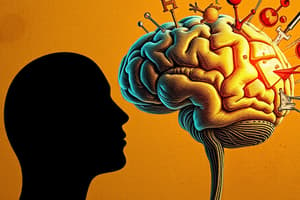Podcast
Questions and Answers
Which attitude towards learning involves the willingness to keep trying despite challenges?
Which attitude towards learning involves the willingness to keep trying despite challenges?
- Persistence (correct)
- Cooperation
- Motivation
- Involvement
What term describes a stimulus that naturally triggers a response without any prior learning?
What term describes a stimulus that naturally triggers a response without any prior learning?
- Unconditioned response
- Unconditioned stimulus (correct)
- Conditioned learned stimulus
- Conditioned response
In behaviorism, what strategy is used to reinforce desired behaviors through consequences?
In behaviorism, what strategy is used to reinforce desired behaviors through consequences?
- Rewards (correct)
- Breaking habits
- Goal setting
- Drill and practice
Which of the following is NOT a critical component of classical conditioning?
Which of the following is NOT a critical component of classical conditioning?
Which approach focuses primarily on the observable behavior of learners rather than internal thoughts or feelings?
Which approach focuses primarily on the observable behavior of learners rather than internal thoughts or feelings?
What is the primary purpose of a health education project?
What is the primary purpose of a health education project?
Which level of health education deals with health groups who may require knowledge about health threats?
Which level of health education deals with health groups who may require knowledge about health threats?
At which level of health education are behavior modifications likely required for at-risk individuals?
At which level of health education are behavior modifications likely required for at-risk individuals?
What is a necessary focus of health education at the tertiary level?
What is a necessary focus of health education at the tertiary level?
Which of the following is an essential step in planning a health education project?
Which of the following is an essential step in planning a health education project?
Flashcards are hidden until you start studying
Study Notes
Learning Outcomes
- Identify human behavior attitudes affecting learning: motivation, involvement, persistence, cooperation, change in behavior.
- Understand educational implications of behaviorism, including the emphasis on observable behaviors and the use of rewards and drills.
- Recognize critical components of human behavior in learning, particularly classical and operant conditioning.
- Explains the health belief model's role in understanding behavior change in learning contexts.
Attitudes Towards Learning
- Motivation is a driving force behind engagement in the learning process.
- Involvement reflects the level of participation and engagement in learning activities.
- Persistence indicates the ability to continue learning despite challenges.
- Cooperation highlights the importance of working effectively with others in educational settings.
- Change in behavior signifies the potential for learning to influence actions and habits.
General Educational Implications of Behaviorism
- Focuses on observable behaviors rather than internal thoughts.
- Encourages repetitive drill and practice to reinforce learning.
- Aims to break bad habits through a structured approach.
- Utilizes reward systems to encourage positive behavior changes.
Classical Conditioning Model
- Founded by Ivan Pavlov in 1927 through experiments with dogs.
- Unconditioned stimulus (UCS) like food triggers unconditioned response (UCR) such as salivation.
- A previously neutral stimulus (like a bell) can become a conditioned learned stimulus (CLS) resulting in a conditioned response (CR).
Key Components of Classical Conditioning
- Unconditioned Stimulus (UCS): Naturally triggers a response.
- Unconditioned Response (UCR): The instinctual reaction to the UCS.
- Conditioned Learned Stimulus (CLS): A neutral stimulus that has been paired with the UCS.
- Conditioned Response (CR): A learned response to the CLS.
Operant Conditioning Model
- Involves reinforcement and punishment to shape behavior.
- Positive reinforcement: Introduction of a favorable event to increase desired behavior.
- Negative reinforcement: Removal of an unfavorable event to strengthen a behavior.
- Punishment: Introduces an adverse outcome or removes a positive condition to decrease behavior.
- Positive punishment: Presentation of a negative outcome to weaken a response.
- Negative punishment: Removal of a pleasant event in response to undesired behavior.
Health Belief Model
- Perceived severity: Individuals' views on the seriousness of a health issue.
- Perceived threat: Belief in one's vulnerability to a health problem.
- Perceived benefit: Confidence that behavior change can alleviate risks.
- Perceived barriers: Personal assessment of obstacles to changing behavior.
- Self-efficacy: Individual belief in their ability to enact change.
Stages of Change (Transtheoretical Model)
- Precontemplation: No intention of behavior change.
- Contemplation: Considering change in the near future.
- Preparation/Determination: Planning how to change behavior.
- Action: Applying the plan to initiate behavior change.
- Maintenance: Sustaining behavior changes over time.
Social Cognitive Theory
- Reinforcement: Outcomes that influence the likelihood of behavior recurrence.
- Behavior capability: Knowledge and skills necessary for behavior change.
- Expectancies: Value placed on the anticipated outcome of behavior modifications.
- Self-efficacy: Confidence in one's ability to succeed in making changes.
- Reciprocal determinism: Interaction between individual behavior and environmental factors affecting learning.
Factors for Analyzing Educational Needs
- Client characteristics: Consider age, ethnicity, gender, and medical diagnosis.
- Education level: Recognize variations from primary to tertiary education, including illiteracy.
- Cultural awareness: Acknowledge beliefs, values, and religious practices impacting learning.
- Socio-economic considerations: Understand a learner's financial and home environment.
Learning Outcomes
- Ability to identify community health education projects.
- Recognition of target groups for health education initiatives.
- Identification of key individuals for project involvement.
- Understanding methods for effectively introducing projects to target groups.
- Assessment of community commitment to health education projects.
Health Education Project Definition
- Aimed at promoting understanding of health, growth, and development.
- Educates about physiology and factors affecting healthy living.
Levels of Health Education Operation
- Health educators work at three equivalent levels in the preventive model.
Primary Level
- Focuses on health groups needing knowledge about potential health threats.
- Aims to inform groups likely to be exposed to specific health risks.
Secondary Level
- Targets both at-risk and ill groups requiring behavioral changes.
- Incorporates both medical and non-medical health educators.
- Provides support for behavior modification for those at higher risk.
- Medical professionals traditionally care for the ill, emphasizing coordinated efforts.
Tertiary Level
- Involves individuals unlikely to achieve complete recovery.
- Focuses on education for adequate recovery, rehabilitation, and preventing relapse.
- Emphasizes the importance of ongoing support for long-term health management.
Studying That Suits You
Use AI to generate personalized quizzes and flashcards to suit your learning preferences.




